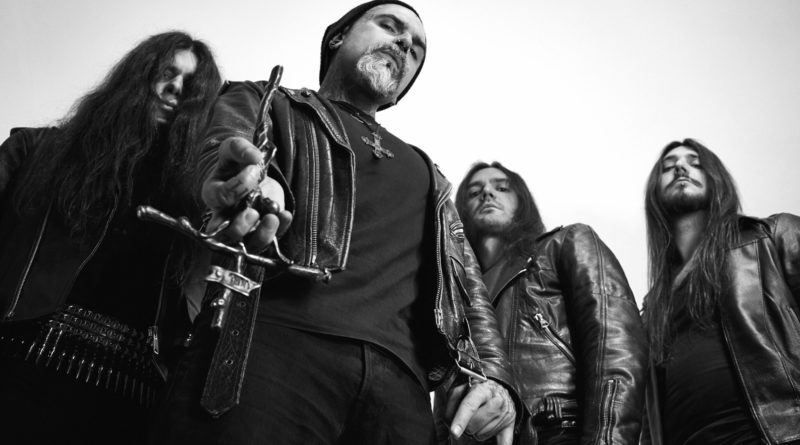Blasphemer: From Gethsemane To Golgotha
Anti-religious sentiment goes hand in hand with extreme metal to the point of cliche. For as long as riffs have been distorted, bands have written lyrics ranging from philosophical scepticism in the face of a deity to out-right blasphemy that, in countries with more draconian laws, would see the artists flogged and imprisoned at best. Fortunately for brutal death metallers BLASPHEMER, Italy’s laws are not so draconian. After an eight-year gap between their debut, On the Inexistence of God, and their well-received sophomore album, Ritual Theophagy, BLASPHEMER are storming back with a vengeance with their newest offering, The Sixth Hour; their most blasphemous record to date.
“The Sixth Hour is inspired by the Way of the Cross, i.e. the last day of Jesus Christ, the path that led him from Gethsemane to Golgotha.” BLASPHEMER guitarist Simone Brigo offers on the concept behind the new record. “It is important to point out that the Way of the Cross is a Catholic devotion which recalls the last steps of Christ’s earthly journey a spiritual pilgrimage usually associated with prayers. Each step of this religious meditation refers to a specific event taken by the gospels and has an iconic representation, which is generally called a ‘station’. The Way of the Cross consists of 14 stations, that can be found in every Catholic Church. Every lyric mostly consists of quotes taken from the gospel and has a subtitle, which is referred to the corresponding station of the Way of the Cross.”
Well, what’s so blasphemous about that? No hyperbolic, fantastical talk of our beloved, armoured bi-pedal goat slaughtering the Messiah in ways so gratuitously violent it would make Tarantino blush; rather a retelling of one of the most important devotions in the Catholic faith. “The idea was taking advantage of all of this strong iconography and purge the religious elements to reduce Christ to merely a human being, weak and scorned, blinded by faith,” Brigo explains. “We tried to transpose this into the music, depicting the agony of a man who is put to death, forsaken by the non-existent fraud he calls God.”
So maybe not a simple retelling after all, then. But the blasphemous elements come from reducing the messiah to a man, rather than the over-the-top violence or sexualisation that many of BLASPHEMER’s peers reduce anti-religious lyrics to and this feels harder hitting, and more effective. Further, this overarching concept offers a fascinating new take on the over-done lyrical trope, with a basis on real religious studies and research.
“We dissected all the gospels and Catholic literature in order to find the element we needed for our blasphemous opus. Quotes are countless, and it’s a very interesting [process] to combine them following unconventional patterns,” Brigo continues, delving further still into the conceptual basis for The Sixth Hour and its creation process. “Giving voice to the Gospel while having obliterated the religious elements leads to a very gloomy chronicle of the death of a man who believed [himself] to be the son of God. Taken out of its religious milieu, the death of Christ represents the tragedy of a man blinded by the belief in a superior entity that remains totally indifferent to his sorrow and his death.”
One of the magical things about concept albums is the way everything ties in together. From the lyrics to the artwork, from the music videos to the music itself. The Sixth Hour is no different, with every aspect of the record coming together as a unified whole; and the experience of the album is all the better for it.
“When I started writing this album I had the whole concept crystal clear in my mind. I knew Jose Gabriel Alegria Sabogal was the right one to draw the artwork, and his style couldn’t be more matching [to the music],” Brigo explains further. “He did a great job and understood deeply the concept behind the music, delivering a perfect figurative transposition of it.” Moving onto the music video for The Deposition, Brigo continues explaining the conceptual link. “Everything revolves around a blasphemous representation of the Eucharist, which is the main ritual connected to the promise of the afterlife for Catholics. The denial of the afterlife is exactly what The Deposition is all about, stating the ultimate death of Christ, denying resurrection.”
It’s also fitting, then, that with their most blasphemous album to date, and their strongest lyrical endeavour, BLASPHEMER also delve deeper into a black metal influence than ever before. “I can’t deny there’s a black metal vibe in this album, but most of the influences came from death metal, from bands like IMMOLATION and INCANTATION. I have never been a stubborn black metal fan, even though I always enjoyed classics; but to be honest I fell in love with black metal pretty late, and when I was writing The Sixth Hour this enthusiasm left its mark.”
The Italian extreme metal scene is in fine form, with the trio of FLESHGOD APOCALYPSE, HOUR OF PENANCE and HIDEOUS DIVINITY leading the charge. With The Sixth Hour proving to be their strongest album to date, and one of the most fascinating death metal concept albums in the last few years, BLASPHEMER are set to join the trio at the top of the Southern European death metal scene. Walk the Way of the Cross with them, and summon darkness over the crucifix.
The Sixth Hour is out now via Candlelight Records.
Like BLASPHEMER on Facebook.

